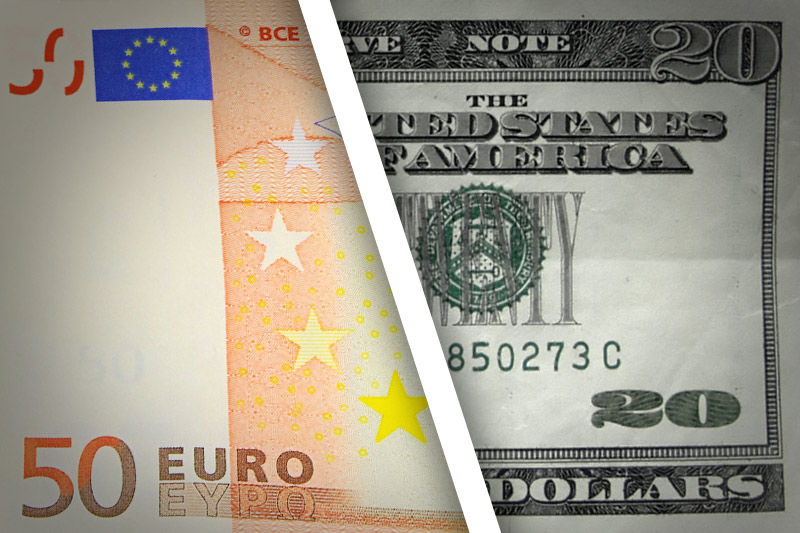Investing.com - The euro slipped lower against the dollar on Wednesday in spite of data showing that the euro zone economy returned to growth in the second quarter, emerging from an 18-month recession.
EUR/USD hit 1.3239 during European afternoon trade, the session low; the pair subsequently consolidated at 1.3248, slipping 0.10%.
The pair was likely to find support at 1.3200 and resistance at 1.3316, Tuesday’s high.
The euro remained supported above the 1.3200 level after Eurostat said the bloc’s economy expanded by 0.3% in the three months to June. Economists had expected quarter-on-quarter growth of 0.2%.
It was the fastest quarterly expansion since the first quarter of 2011.
France’s economy expanded 0.5% in the three months to June, following two consecutive quarters of contraction, while Germany’s economy expanded by a larger than forecast 0.7%.
Demand for the dollar continued to be underpinned after U.S. retail sales data on Tuesday reinforced the view that the economic recovery is strong enough for the Federal Reserve to begin phasing out its USD85 billion-a-month asset purchase program later this year.
The euro slipped lower against the pound, with EUR/GBP down 0.39% to 0.8550.
Sterling was boosted after official data showed that the U.K. unemployment rate remained unchanged at 7.8% in June, in line with expectations. The number of people claiming unemployment benefits fell by 29,200 in July, better than expectations for a decline of 15,000.
Meanwhile, the minutes of the Bank of England’s July meeting showed that the decision to provide forward guidance on future rate increases was not unanimous. Monetary Policy Committee member Martin Weale wanted tougher measures to ensure that the pledge to hold rates at record lows did not lead to a pickup in inflation.
Last week the BoE announced plans to keep interest rates on hold at record lows as long as the U.K. unemployment rate remains above 7%.
The minutes showed that policymakers voted unanimously in favor of keeping the bank rate steady at 0.5% and the asset purchase program unchanged at GBP375 billion.
The euro was slightly lower against the yen, with EUR/JPY dipping 0.05% to 130.17.
EUR/USD hit 1.3239 during European afternoon trade, the session low; the pair subsequently consolidated at 1.3248, slipping 0.10%.
The pair was likely to find support at 1.3200 and resistance at 1.3316, Tuesday’s high.
The euro remained supported above the 1.3200 level after Eurostat said the bloc’s economy expanded by 0.3% in the three months to June. Economists had expected quarter-on-quarter growth of 0.2%.
It was the fastest quarterly expansion since the first quarter of 2011.
France’s economy expanded 0.5% in the three months to June, following two consecutive quarters of contraction, while Germany’s economy expanded by a larger than forecast 0.7%.
Demand for the dollar continued to be underpinned after U.S. retail sales data on Tuesday reinforced the view that the economic recovery is strong enough for the Federal Reserve to begin phasing out its USD85 billion-a-month asset purchase program later this year.
The euro slipped lower against the pound, with EUR/GBP down 0.39% to 0.8550.
Sterling was boosted after official data showed that the U.K. unemployment rate remained unchanged at 7.8% in June, in line with expectations. The number of people claiming unemployment benefits fell by 29,200 in July, better than expectations for a decline of 15,000.
Meanwhile, the minutes of the Bank of England’s July meeting showed that the decision to provide forward guidance on future rate increases was not unanimous. Monetary Policy Committee member Martin Weale wanted tougher measures to ensure that the pledge to hold rates at record lows did not lead to a pickup in inflation.
Last week the BoE announced plans to keep interest rates on hold at record lows as long as the U.K. unemployment rate remains above 7%.
The minutes showed that policymakers voted unanimously in favor of keeping the bank rate steady at 0.5% and the asset purchase program unchanged at GBP375 billion.
The euro was slightly lower against the yen, with EUR/JPY dipping 0.05% to 130.17.
